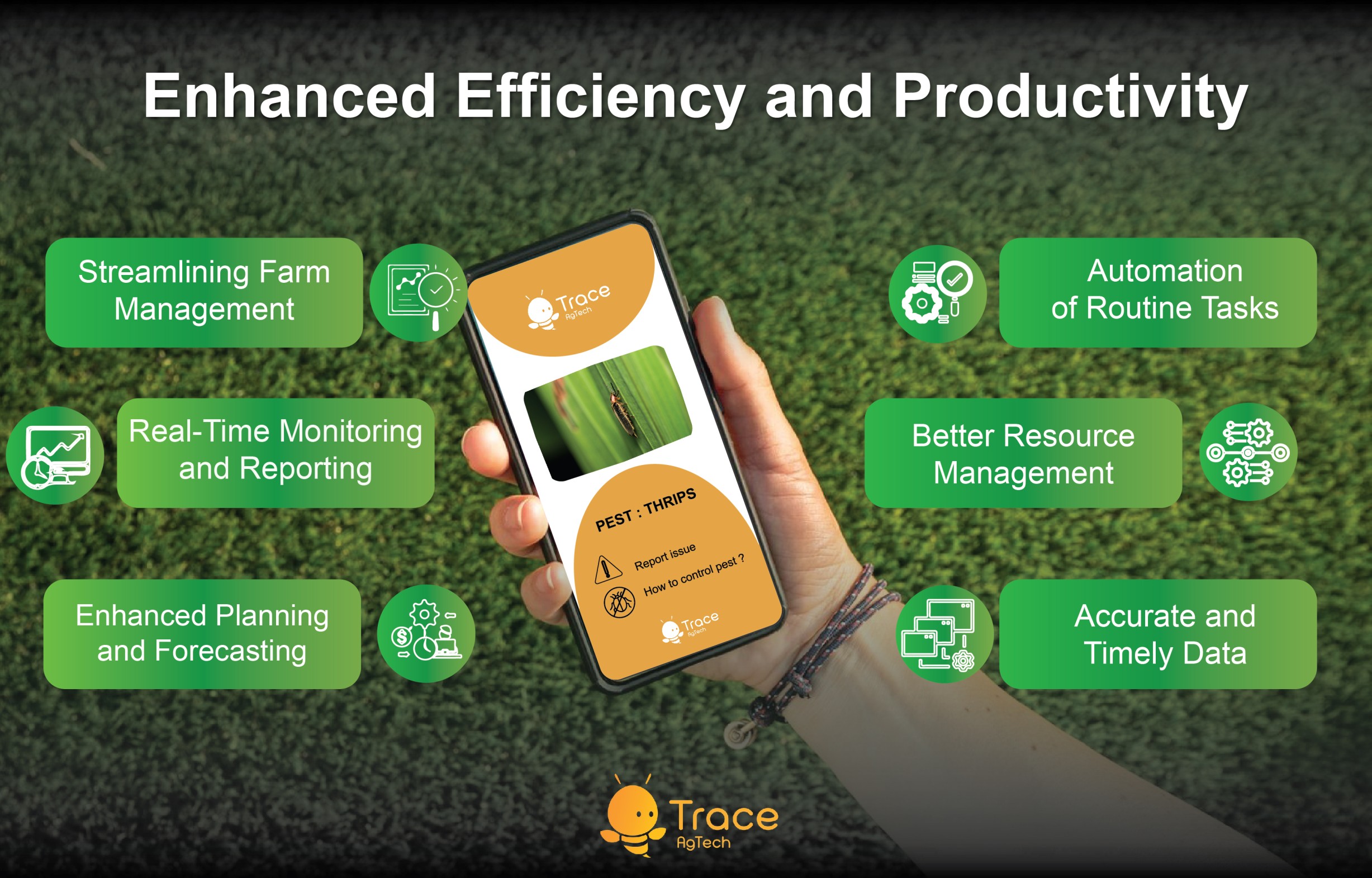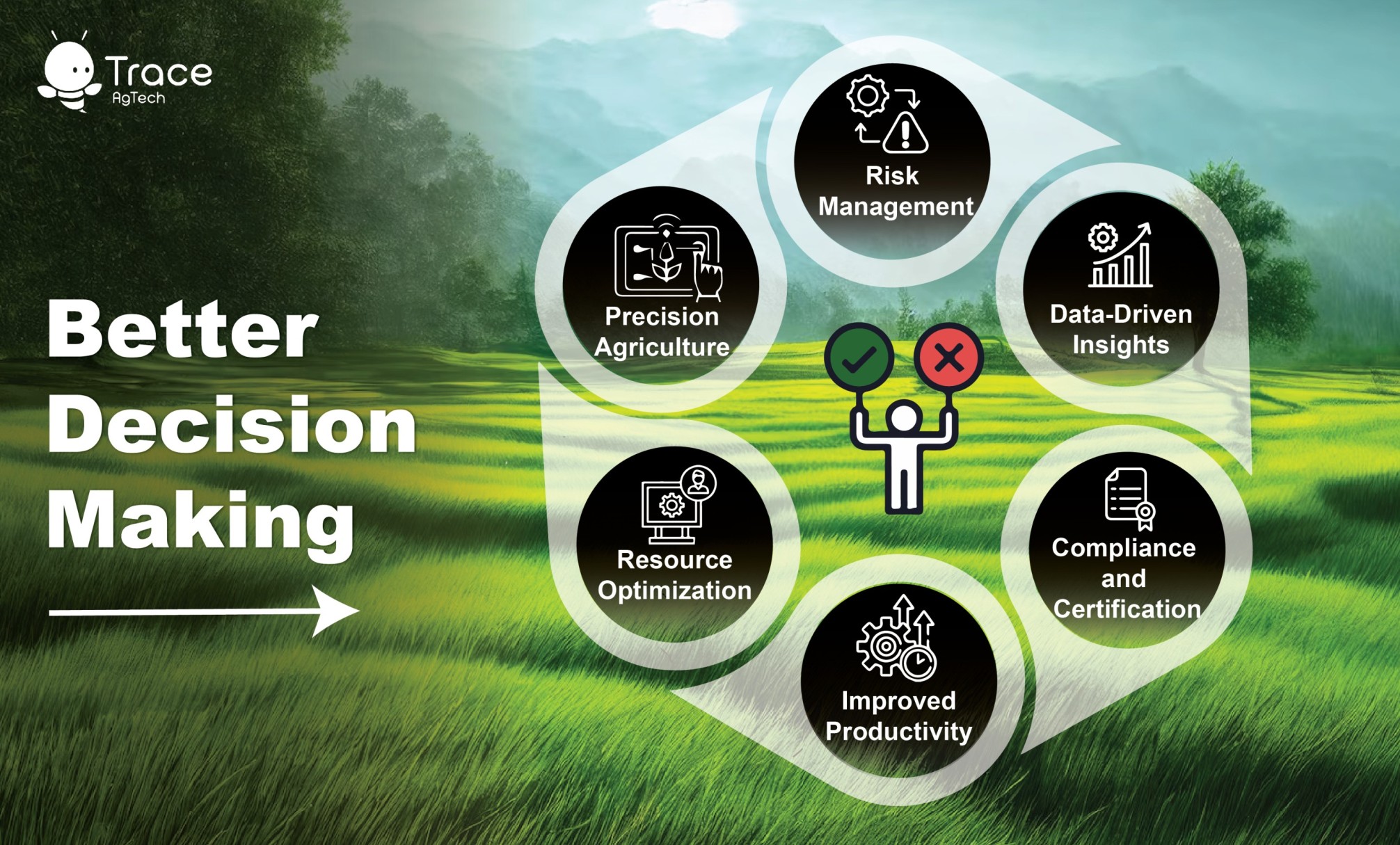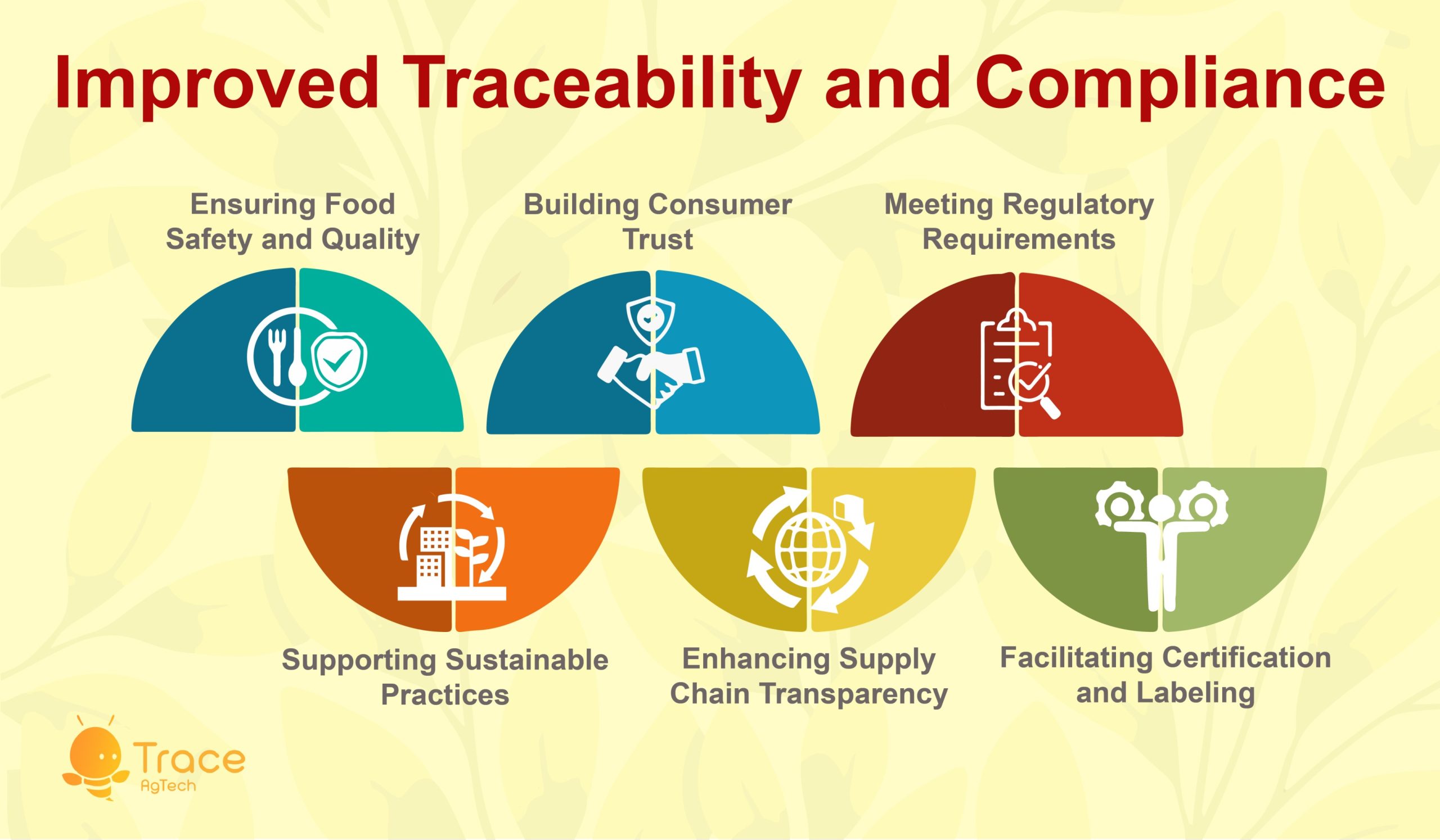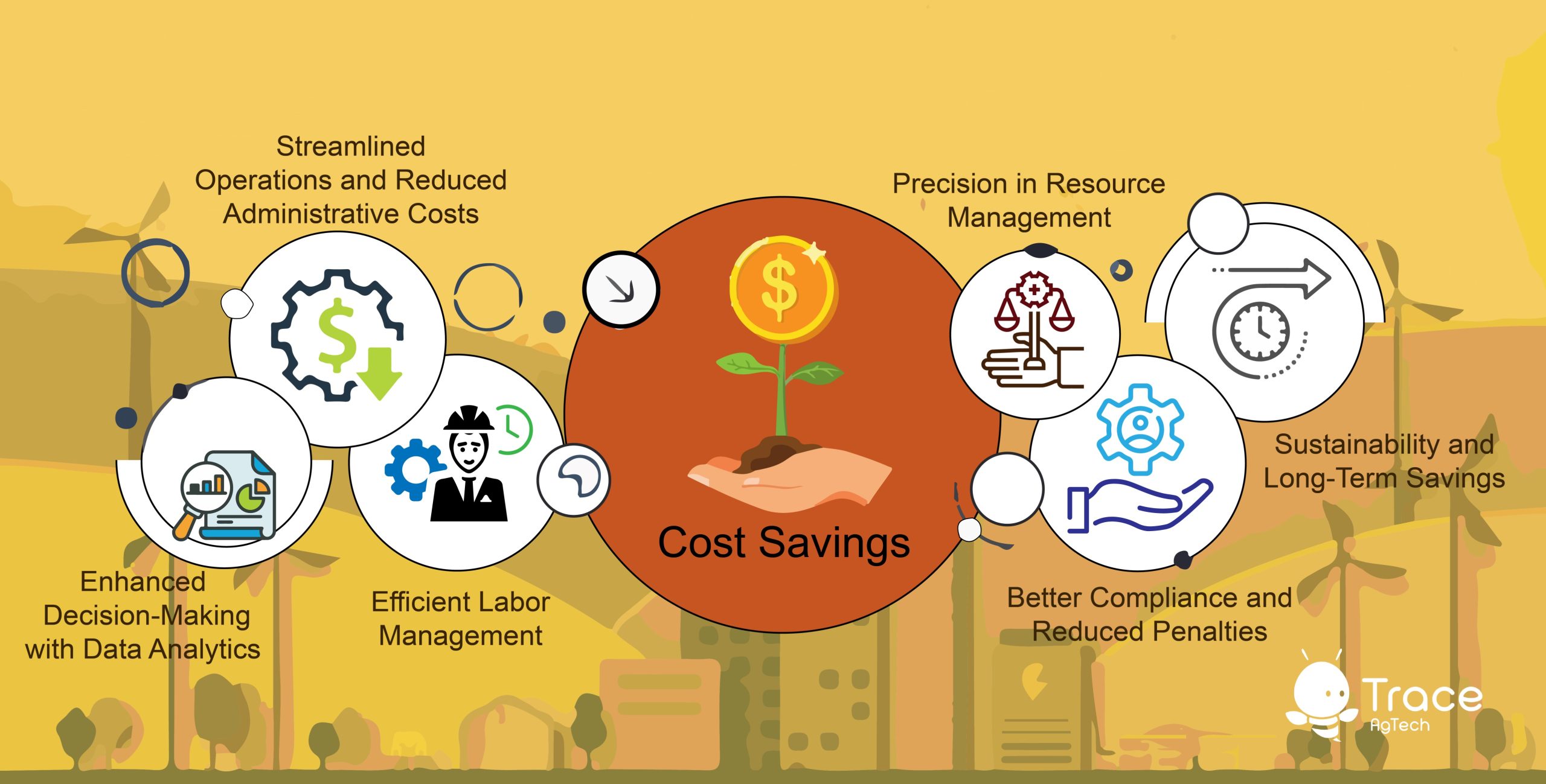Top 6 Reasons Why Keeping A Digital Farm Record is a Game Changer
In today’s fast-paced agricultural landscape, digital farm record Keeping is more important than ever. Digital record keeping is revolutionizing the way farmers manage their operations, making it easier to track, analyze, and improve every aspect of their business. Here are the top seven reasons why digital record keeping is a game changer in modern agriculture.
1. Enhanced Efficiency and Productivity
Digital record keeping streamlines the management of farm operations. With data at your fingertips, you can quickly access information about planting schedules, harvest times, equipment maintenance, and more. This improved efficiency means less time spent on paperwork and more time dedicated to productive activities. Automation of routine tasks also reduces human error, ensuring that your records are always accurate and up-to-date. Let’s delve into why enhanced efficiency and productivity through digital record keeping are crucial for today’s agricultural operations.
-
Streamlining Farm Management
– Digital record keeping simplifies the complex task of managing a farm. Traditional methods involving pen, paper, and spreadsheets are time-consuming and prone to errors. Digital tools, on the other hand, offer a centralized platform where all farm-related data can be stored, accessed, and analyzed. This includes information on planting schedules, crop yields, equipment maintenance, and labor usage. Having everything in one place not only saves time but also ensures that critical information is always at hand..
-
Automation of Routine Tasks
– One of the key benefits of digital record keeping is the automation of routine tasks. Automated data entry, reminders, and notifications reduce the need for manual input, freeing up valuable time for farmers and their staff. For instance, automated irrigation systems can be programmed to operate based on real-time weather data and soil moisture levels, ensuring optimal water use without constant supervision. This level of automation enhances productivity by allowing farmers to focus on more strategic aspects of their operations.
-
Accurate and Timely Data
– Accurate data is the foundation of efficient farm management. Digital record keeping eliminates the errors commonly associated with manual data entry. GPS-enabled devices and sensors can automatically record data such as planting dates, crop growth stages, and harvest times. This real-time data collection ensures that records are always up-to-date and accurate, providing a solid basis for decision-making. With precise data, farmers can identify inefficiencies, track progress, and make adjustments as needed to improve productivity.
-
Better Resource Management
– Efficient use of resources is essential for maximizing productivity and minimizing costs. Digital record keeping enables farmers to monitor the use of seeds, fertilizers, water, and other inputs with precision. By analyzing data on resource usage, farmers can identify patterns and optimize their practices. For example, precision agriculture tools can guide the application of fertilizers and pesticides, ensuring they are used only where needed and in the right amounts. This targeted approach not only boosts yields but also reduces waste and environmental impact.
-
Enhanced Planning and Forecasting
– Planning and forecasting are critical components of successful farming. Digital record keeping provides the data needed to make informed decisions about future activities. Historical records and trend analysis can help farmers predict yields, plan planting schedules, and allocate resources effectively. This proactive approach to planning reduces uncertainties and enhances the farm’s overall productivity. Moreover, digital tools can simulate different scenarios, allowing farmers to evaluate the potential impact of various strategies before implementation.
-
Real-Time Monitoring and Reporting
– Digital record keeping offers the advantage of real-time monitoring and reporting. Farmers can track the status of their crops, livestock, and equipment from anywhere using mobile devices. This immediate access to information allows for quick responses to emerging issues, such as pest infestations or equipment failures. Real-time reporting also facilitates compliance with regulatory requirements and provides valuable insights for stakeholders, including investors, partners, and customers.

Enhanced efficiency and productivity through digital record keeping are transforming the agricultural landscape. By streamlining management tasks, automating routine processes, providing accurate data, and improving resource management, digital tools empower farmers to operate more effectively and sustainably. The ability to plan, forecast, and respond in real-time further enhances the farm’s productivity and resilience. As the agricultural industry continues to evolve, embracing digital record keeping is not just an option but a necessity for staying competitive and achieving long-term success.3
2. Better Decision-Making
Accurate and comprehensive records provide valuable insights into your farm’s performance. By analyzing trends and patterns in your data, you can make informed decisions about crop selection, planting strategies, and resource allocation. Digital tools can also help you forecast yields, plan for future growth, and adapt to changing market conditions, giving you a competitive edge. Digital farm record keeping has emerged as a powerful tool that empowers farmers with the data and insights needed to make better decisions. Here’s why better decision-making through digital record keeping is so important for today’s farmers.
-
Data-Driven Insights
– Digital record keeping provides farmers with a wealth of data at their fingertips. From soil health and weather patterns to crop yields and pest occurrences, every piece of information can be meticulously tracked and analyzed. This data-driven approach allows farmers to identify trends and patterns that would be difficult to discern through manual record keeping. By leveraging these insights, farmers can make informed decisions that optimize their farming practices.
-
Precision Agriculture
– Precision agriculture relies heavily on accurate and detailed data. Digital records enable farmers to implement precision techniques such as variable rate planting and targeted irrigation. By applying the right amount of inputs at the right time and place, farmers can increase yields and reduce waste. This level of precision would be impossible without the detailed data provided by digital record keeping.
-
Resource Optimization
– Effective resource management is critical for the sustainability and profitability of a farm. Digital record keeping allows farmers to track the usage of seeds, fertilizers, pesticides, and water. By analyzing this data, farmers can identify areas where resources are being under or over-utilized. This enables them to optimize resource allocation, reducing costs and minimizing environmental impact.
-
Risk Management
– Agriculture is inherently risky due to factors such as weather variability, pest infestations, and market fluctuations. Digital records help farmers manage these risks by providing accurate and timely information. For example, historical weather data can inform decisions about planting dates and crop selection, while pest monitoring data can guide timely interventions. Additionally, market data can help farmers make better decisions about when and what to sell, reducing financial risk.
-
Compliance and Certification
– With increasing regulatory requirements and consumer demand for transparency, compliance has become a significant aspect of modern farming. Digital record keeping simplifies compliance by maintaining detailed and organized records that can be easily accessed and shared. This is particularly important for obtaining certifications such as organic or fair trade, which require rigorous documentation. Better decision-making supported by digital records ensures that farmers can meet these standards efficiently.
-
Improved Productivity
– Making better decisions directly translates to improved productivity on the farm. By using data to guide planting schedules, irrigation practices, and pest management strategies, farmers can increase their yields. Moreover, digital tools can help identify inefficiencies in operations, allowing for continuous improvement. This not only boosts productivity but also enhances the overall sustainability of the farm.

Better decision-making is at the heart of successful farming, and digital record keeping is the key to achieving it. By providing accurate, timely, and detailed data, digital records empower farmers to make informed decisions that enhance productivity, optimize resources, manage risks, ensure compliance, improve financial management, and plan for the future. In an industry where margins are tight and sustainability is critical, the importance of better decision-making through digital farm record keeping cannot be overstated. Embracing this technology is not just a smart move; it’s a necessity for the modern farmer aiming to thrive in today’s agricultural landscape.
3. Improved Traceability and Compliance
With growing concerns about food safety and sustainability, traceability has become a critical aspect of modern agriculture. Digital record keeping makes it easier to track the origin and movement of products throughout the supply chain. This transparency not only builds trust with consumers but also ensures compliance with regulatory requirements. In the event of a recall, having detailed records allows for quick identification and resolution of issues. Here’s why improved traceability and compliance are so crucial in modern farming.
-
Ensuring Food Safety and Quality
– Food safety is a top priority for consumers and regulatory bodies alike. Digital record keeping enables farmers to maintain detailed records of every stage of production, from planting to harvest to distribution. This comprehensive documentation helps ensure that all safety protocols are followed and allows for quick identification of any potential issues. In the event of a contamination incident, having accurate and accessible records means that affected batches can be traced and removed from the supply chain swiftly, minimizing risk to consumers.
-
Building Consumer Trust
– Today’s consumers are more informed and concerned about where their food comes from and how it’s produced. They seek transparency and are more likely to trust brands that can provide detailed information about the origin and handling of their products. Digital traceability allows farmers to offer this transparency, providing consumers with the confidence that their food is safe, sustainably produced, and ethically sourced. This trust can translate into increased customer loyalty and a stronger market position.
-
Meeting Regulatory Requirements
– Agricultural regulations are becoming increasingly stringent, with governments and international bodies imposing rigorous standards to ensure food safety and environmental sustainability. Compliance with these regulations is mandatory and often requires extensive documentation. Digital record keeping simplifies the compliance process by automating the collection and storage of necessary data, ensuring that all required information is readily available for inspections and audits. This not only helps in avoiding legal penalties but also enhances the farm’s reputation as a responsible and compliant entity.’
-
Enhancing Supply Chain Transparency
– Improved traceability extends beyond the farm to the entire supply chain. Digital records facilitate seamless communication and data sharing among different stakeholders, including suppliers, processors, distributors, and retailers. This interconnectedness ensures that every participant in the supply chain has access to accurate and up-to-date information about the product’s journey. Enhanced transparency helps in optimizing logistics, reducing waste, and ensuring that products meet quality standards at every stage.
-
Facilitating Certification and Labeling
– Various certifications, such as organic, fair trade, and non-GMO, require strict adherence to specific practices and thorough documentation. Digital record keeping makes it easier for farmers to achieve and maintain these certifications by providing a reliable system for tracking compliance with certification standards. Accurate records are essential for audits and inspections, and they also support marketing efforts by enabling the use of labels that appeal to conscientious consumers.
-
Supporting Sustainable Practices
– Sustainability is a key focus in modern agriculture, and digital traceability plays a crucial role in promoting environmentally friendly practices. By tracking resource use, emissions, and waste, farmers can identify areas for improvement and implement more sustainable methods. Compliance with environmental regulations and sustainability standards is easier to achieve and demonstrate with digital records, contributing to the overall goal of reducing the agricultural sector’s ecological footprint.

Improved traceability and compliance are fundamental components of digital farm record keeping that bring numerous benefits to modern agriculture. By ensuring food safety, building consumer trust, meeting regulatory requirements, enhancing supply chain transparency, facilitating certification, improving crisis management, and supporting sustainability, digital record keeping positions farms for success in an increasingly complex and demanding industry. Embracing digital tools for traceability and compliance is not just about keeping up with the times; it’s about leading the way towards a safer, more transparent, and sustainable future for agriculture.
4. Cost Savings
Transitioning to digital record keeping can result in significant cost savings. By reducing the need for physical storage and minimizing paperwork, you can lower administrative expenses. Additionally, accurate records help optimize the use of inputs like seeds, fertilizers, and water, leading to cost-effective farming practices. The ability to monitor and manage expenses in real-time also helps in identifying areas where costs can be cut without compromising productivity. Here’s why cost savings in digital farm record keeping are essential for the future of farming.
-
Streamlined Operations and Reduced Administrative Costs
– One of the most immediate benefits of digital record keeping is the reduction of administrative costs. Traditional paper-based systems are not only cumbersome but also require substantial time and resources to manage. Digital records eliminate the need for physical storage and simplify data entry, retrieval, and analysis. This streamlining of operations reduces labor costs associated with manual record keeping and allows farm staff to focus on more value-added tasks.
-
Precision in Resource Management
– Digital record keeping provides farmers with detailed insights into the usage of key resources such as seeds, fertilizers, water, and pesticides. By accurately tracking these inputs, farmers can optimize their use, avoiding over-application and minimizing waste. Precision in resource management not only leads to cost savings but also enhances crop yields and quality. For instance, applying the right amount of fertilizer at the right time can significantly boost plant health and productivity, translating to higher profits.
-
Enhanced Decision-Making with Data Analytics
– Access to real-time data and analytics is a game changer for farm management. Digital record keeping tools offer comprehensive reports and dashboards that help farmers make informed decisions. By analyzing historical data and current trends, farmers can identify patterns, forecast yields, and plan planting schedules more effectively. This data-driven approach reduces the risk of costly mistakes and enables proactive management practices that save money in the long run.
-
Better Compliance and Reduced Penalties
– Compliance with agricultural regulations is essential but can be a complex and costly process. Digital record keeping simplifies compliance by providing an organized and easily accessible database of required information. Accurate records ensure that farmers can quickly and efficiently respond to audits and inspections, avoiding potential fines and penalties. Moreover, digital records facilitate adherence to best practices and standards, contributing to overall cost savings.
-
Efficient Labor Management
– Labor is one of the highest costs in farming operations. Digital tools help streamline labor management by tracking employee work hours, tasks, and productivity. This detailed monitoring allows farmers to optimize labor allocation, ensuring that workers are deployed where they are most needed and reducing idle time. Efficient labor management not only lowers costs but also boosts overall farm productivity.
-
Sustainability and Long-Term Savings
– Sustainable farming practices are increasingly becoming a requirement rather than a choice. Digital record keeping supports sustainability by enabling precise tracking of resource use and environmental impact. Implementing sustainable practices often leads to long-term cost savings through improved soil health, water conservation, and reduced reliance on chemical inputs. These practices not only lower operational costs but also enhance the farm’s resilience and marketability.

Cost savings are a critical component of modern agricultural success, and digital record keeping is a powerful tool in achieving them. By streamlining operations, enhancing decision-making, optimizing resource use, and ensuring compliance, digital tools help farmers reduce costs and improve profitability. The transition to digital is not merely a technological upgrade; it is a strategic move that positions farms for sustainable and profitable growth. As the agricultural industry continues to evolve, the importance of cost savings through digital record keeping will only become more pronounced, making it an indispensable aspect of farm management.
5. Enhanced Collaboration and Communication
Digital platforms facilitate better communication and collaboration among farm workers, managers, and external stakeholders. Shared access to real-time data ensures that everyone is on the same page, reducing misunderstandings and improving coordination. This collaborative approach is particularly beneficial for larger operations or those with multiple locations, where effective communication is key to success. Here’s how digital record keeping enhances collaboration and communication on the farm.
-
Real-Time Data Sharing
– One of the most significant advantages of digital record keeping is the ability to share data in real-time. When farm workers, managers, and external stakeholders have access to up-to-date information, decision-making becomes more efficient and informed. This instant access to data ensures that everyone is aligned and working towards the same goals, reducing the likelihood of errors and misunderstandings.
-
Streamlined Operations
– Digital platforms consolidate various aspects of farm management into a single system. From crop schedules and weather forecasts to equipment maintenance and inventory levels, all critical information is stored and accessible in one place. This centralization streamlines operations, making it easier for teams to coordinate activities and allocate resources effectively. As a result, tasks are completed more efficiently, and productivity increases.
-
Improved Communication Channels
– Effective communication is the backbone of any successful operation. Digital record keeping systems often come with built-in communication tools, such as messaging apps, notifications, and alerts. These features facilitate seamless communication between team members, regardless of their location. For instance, a farm manager can send an instant update to field workers about a change in plans or a weather alert, ensuring timely and coordinated responses.
-
Enhanced Transparency and Accountability
– Digital records create a transparent environment where all actions and decisions are documented and accessible. This transparency fosters accountability among team members, as everyone can see who is responsible for specific tasks and activities. When employees know that their actions are being tracked, they are more likely to adhere to best practices and follow protocols, leading to improved performance and fewer mistakes.
-
Better Collaboration with External Stakeholders
– Farming involves collaboration with various external stakeholders, including suppliers, buyers, agronomists, and regulatory bodies. Digital record keeping facilitates better communication and coordination with these stakeholders by providing them with access to relevant data. For example, sharing real-time inventory levels with suppliers can ensure timely deliveries, while providing buyers with detailed production records can enhance trust and strengthen business relationships.
-
Data-Driven Decision Making
– Access to comprehensive and accurate data enables better decision-making at all levels of the farm operation. Teams can analyze historical data to identify trends, assess the effectiveness of different practices, and make informed adjustments. Collaborative data analysis sessions can bring together diverse perspectives, leading to more innovative solutions and strategies. This data-driven approach ensures that decisions are based on evidence rather than intuition, improving outcomes.
-
Training and Knowledge Sharing
– Digital record keeping systems can also serve as valuable training tools. New employees can quickly get up to speed by accessing historical records and learning about the farm’s operations. Additionally, experienced workers can document their knowledge and best practices within the system, creating a repository of information that can be shared with the entire team. This continuous learning environment fosters a culture of knowledge sharing and improvement.
Digital record keeping is transforming the way farms operate by enhancing collaboration and communication. Real-time data sharing, streamlined operations, improved communication channels, and better collaboration with external stakeholders are just a few of the benefits that digital systems bring to modern agriculture. By embracing digital record keeping, farms can create a more transparent, accountable, and efficient working environment, ultimately leading to greater success and sustainability in the agricultural sector.
6. Environmental Sustainability
Sustainable farming practices are essential for the long-term health of our planet. Digital record keeping helps farmers monitor and manage their environmental impact more effectively. By tracking resource usage, emissions, and waste, farmers can implement practices that reduce their carbon footprint and promote biodiversity. This proactive approach to sustainability not only benefits the environment but also enhances the farm’s reputation and marketability. Here’s how digital farm record keeping promotes environmental sustainability.
-
Precision in Resource Management
– One of the most significant benefits of digital record keeping is the ability to manage resources with precision. Traditional farming often relies on estimates and general practices, which can lead to overuse of water, fertilizers, and pesticides. Digital tools, however, provide detailed data on soil conditions, weather patterns, and crop health, enabling farmers to apply the exact amount of inputs needed. This precision reduces waste, minimizes runoff, and conserves resources, leading to more sustainable farming practices.
-
Efficient Water Use
– Water is a critical resource in agriculture, and its efficient use is essential for sustainability. Digital record keeping systems can integrate with irrigation technologies to monitor soil moisture levels in real time. This allows farmers to apply water only when and where it’s needed, reducing wastage and preventing over-irrigation. Smart irrigation systems, guided by digital records, can significantly lower water consumption, contributing to the conservation of this vital resource.
-
Reduced Chemical Usage
– The environmental impact of pesticides and fertilizers is a major concern in modern agriculture. Excessive use can lead to soil degradation, water pollution, and loss of biodiversity. Digital record keeping helps farmers track the application of chemicals precisely, ensuring they are used only when necessary and in appropriate quantities. Integrated pest management systems, supported by digital records, can also predict pest outbreaks, enabling timely and targeted interventions that minimize chemical use.
-
Lower Carbon Footprint
– Agriculture is a significant source of greenhouse gas emissions, but digital record keeping can help mitigate this impact. By optimizing machinery use and improving crop management practices, farmers can reduce fuel consumption and emissions. Digital records provide insights into the most efficient routes and schedules for machinery, reducing unnecessary trips and idle time. Furthermore, precision farming techniques, supported by digital data, enhance crop yields and soil health, leading to lower emissions per unit of produce.
-
Enhanced Soil Health
– Healthy soil is the foundation of sustainable agriculture. Digital record keeping allows farmers to monitor soil health parameters such as pH levels, nutrient content, and organic matter. With this information, farmers can adopt practices that maintain or improve soil fertility, such as crop rotation, cover cropping, and reduced tillage. These practices not only enhance productivity but also prevent soil erosion, promote biodiversity, and sequester carbon, contributing to long-term soil health and sustainability.
-
Waste Reduction
– Effective waste management is another crucial aspect of environmental sustainability. Digital record keeping helps track the entire lifecycle of farm inputs and outputs, from seeds and fertilizers to crop yields and by-products. This comprehensive tracking allows farmers to identify areas where waste can be minimized, whether through improved storage, better handling practices, or recycling initiatives. Reducing waste not only lowers environmental impact but also enhances the overall efficiency and profitability of the farm.
Digital farm record keeping is a transformative tool for promoting environmental sustainability in agriculture. By enabling precise resource management, reducing chemical usage, lowering carbon footprints, enhancing soil health, minimizing waste, and supporting biodiversity, digital records empower farmers to adopt more sustainable practices. As the agricultural sector continues to face challenges related to climate change and resource scarcity, embracing digital technologies will be essential for building a more sustainable and resilient future for farming.
Conclusion
Digital record keeping is transforming modern agriculture, offering numerous benefits that enhance efficiency, decision-making, traceability, cost savings, collaboration, sustainability, and future readiness. By embracing this technology, farmers can not only improve their operations but also contribute to a more sustainable and resilient agricultural sector. The shift to digital is not just a trend—it’s a fundamental change that is reshaping the future of farming.


Any comments?